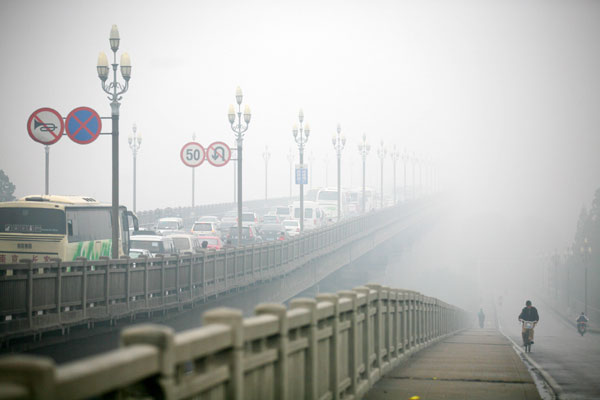 |
|
Vehicles, cyclists and pedestrians move slowly in heavy fog on the Yangtze bridge in Nanjing, Jiangsu province, on Friday. Dense fog and haze enveloped most parts of northern, northeastern and eastern China on Friday, causing disruption to traffic and people's daily lives. Provided to China Daly |
Light fog hung over North China on Friday, causing the suspension of flights and closure of expressways, while most parts of East China were affected by haze, meteorological authorities said.
In Beijing, air pollution was severe and the situation will not be alleviated until this afternoon, the Beijing Municipal Environmental Monitoring Center said.
A National Meteorological Center spokesman told China Daily that the steady atmospheric conditions made it "unlikely" that the fog and haze would disperse soon, adding that a cold front will come to North China and cause strong winds in Beijing, Tianjin and many parts in Hebei province, which could help clear the fog.
Beginning early morning on Friday, light fog began to concentrate over northern and eastern parts of the country, with visibility dramatically reduced in Beijing, Tianjin, most parts of Hebei province, central and southern parts of Liaoning province, and some parts of Jiangsu, Anhui, Fujian and Yunnan provinces, the National Meteorological Center said on its website.
Meanwhile, most of the eastern coastal regions saw haze on Friday, it added.
The Beijing Meteorological Bureau issued two yellow warnings of fog on Friday, saying heavy fog would linger in the capital city for a whole day and visibility would be affected.
The meteorological authorities use a four-tier color-coded weather warning system, with red being the most severe, followed by orange, yellow and blue.
The Beijing sections of expressways linking the capital and Shanghai, Tianjin, Hong Kong and Macao, Harbin of Heilongjiang province, and Kaifeng of Henan province were all temporarily closed in the early morning, and only reopened in the afternoon.
However, serious congestion remained all day on most of the expressways.
One Beijing white-collar worker said on her micro blog: "The company organized a tour for us and we set out on 4 am. But the expressways were closed and jammed with traffic.
"A six-hour drive turned out to be a daylong torture."
Twenty-four flights departing Beijing Capital International Airport were canceled on Friday morning, and 24 others delayed more than an hour.
Shuttle buses running between the airport and cities such as Tianjin, Tangshan and Qinhuangdao were suspended on Friday morning.
In addition to Beijing, Tianjin, Hebei and Liaoning also issued yellow warnings of fog on Friday morning.
In Tianjin, police vehicles were dispatched to control traffic on the expressway that links the city's urban area and its Binhai New Area. Other expressways were all temporarily closed due to poor visibility.
Dense fog also resulted in overloading on local public transport, with buses reporting 20 percent more passengers than usual.
Many flights departing or arriving at Tianjin were delayed or canceled.
In Hebei, Liaoning, Heilongjiang, Shandong and Hubei provinces, expressways were also closed because of fog or haze. Some closures lasted until late night on Friday, according to the Ministry of Transport.
"The fog and haze affecting North and East China this time were generated by the combination of an incoming wind that goes southward, high humidity, and a temperature drop in the night," said He Lifu, chief weather forecaster of the National Meteorological Center.
"The atmospheric cycle has been steady for days, which makes it unlikely the fog and haze will disperse very soon."
He added that a cold front is expected to affect North China and cause strong winds in Beijing, Tianjin and many parts in Hebei province. The wind will in turn clear the fog in these areas, he said.
Air pollution was severe on Friday and the situation will not be alleviated until this afternoon, according to the Beijing Municipal Environmental Monitoring Center. It suggested that people allergic to air pollution should not spend much time outside.
